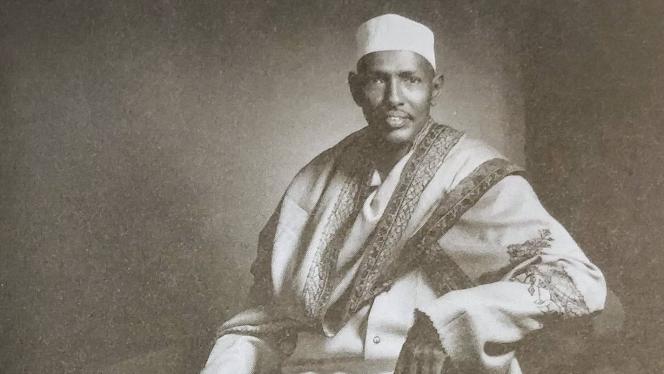Thursday 2 May 2024
In the shadow of Eagles: reflections on Somalia and its scholars

Professor John ‘Jaamac’ Johnson recalls his visits to Somalia in the 1960s and his interactions with scholars, poets and writers.
One pleasant summer afternoon in 1968, a group of friends embarked on a train journey from London, heading north to visit another friend at her countryside residence in rural England. At the time, I was a young Peace Corps Volunteer taking a break from my service in the Somali Republic, on a long transit through England en route to my home in Texas. My plan was to enrol at the School of Oriental and African Studies (SOAS) at the University of London, pursuing an MPhil degree under the guidance of Professor Bogumił Witalis (‘Goosh’) Andrzejewski.
I was joining Goosh (SOAS) and his wife Sheila, together with a pantheon of Somali studies scholars including Ioan M. Lewis and Muuse Xaaji Ismaaciil Galaal (Somali Academy of Science and Arts and Secretary of the United Nations Delegation in Somalia), to visit their friend, the Canadian novelist and Poet Laureate of Canada, Margaret Laurence, in her summer cottage in England.
We enjoyed a delightful afternoon, reminiscing about our experiences in colonial Somaliland and later in the independent Somali Republic. To say the least, I was in awe of these scholars and deeply grateful to be in their company. My friendships, interactions, and correspondence with each of them, including Margaret Laurence, endured for many years.
When I returned to Somalia after my period of home leave, I would continue to study Somali language and culture with Goosh and Muusa. I would go on to complete my degree in London after my service in Somalia. For some time before my home leave, I had been working with Muusa in his office in the Department of Education and at Mariano’s bar and tea shop in the evenings after teaching English and math at the Scuola Media Sezione Staccato in Mogadishu.
In the evenings (and sometime in the afternoons) Muusa and I would work on translating Somali gabayo and other genres of poetry into English, and I would help him edit the texts so that they would sound right in English. We always collaborated in the open where people could see what we were doing, because of the unfounded Somali suspicion that we might be spies.
Sometimes, I would accompany him to various embassies and offices in the evening to discuss his scholarship and to review some of the poems we had translated together. Muusa was also an accomplished poet in his own right. I regarded him as my mentor in Somali language and culture.
After Goosh arrived in Somalia on sabbatical during my third year, we began in earnest studying Somali linguistics and the culture he was acquainted with for many years. SOAS would see fit to count my next year of study in residence in Somalia working with my professor Goosh Andrzejewski. I gathered on tape many Somali heelloyin, which would later become the topic of my thesis at SOAS.
When my fiancée, Elizabeth, arrived in Somalia, she started working in the Peace Corps office. Goosh was my best man, Sheila served as our matron-of-honour, and Muusa recited a gabay at our wedding. Initially, we were married by the mayor of Mogadishu in a civil ceremony, as neither of us were Muslims. I can't recall the mayor’s name, but he sported a large handlebar moustache and was nicknamed Stalin. Six days later, we had a nuptial high mass officiated by an Anglican priest visiting the British embassy. To this day, we stay in touch with Fr. Philip Cousins, now 91 years old and residing in Yorkshire, England.
All these great scholars have passed away; the eagles are gone, but the sparrow, who is himself 82 years old, still survives. He has a broken wing and may not live much longer but, he often daydreams of those wonderful years in Somalia (nearly seven in all), and of all those eagles. However, the sparrow rejoices in the fact that Somali scholarship now rests in the capable hands of many competent Somali scholars, too numerous to mention in this short essay.
May I close with a quote I read many years ago in Margery Perham’s book Major Dane’s Garden:
Somalia is the hardest place you will ever Love.
And when you leave, you will do everything in your power to get back there.
Partial Bibliography
Andrzejewski, B.W., and Sheila Andrzejewski, An Anthology of Somali Poetry (Bloomington, Indiana: I.U. Press, 1993)
————, Declensions of Somali Nouns (London: School of Oriental and African Studies, 1964)
————., ed., trans., Ignorance is the Enemy of Love, by Faarax Maxamed Jaamac (London: Zed Press, 1982)
————, ed., trans., Leopard Among the Women: Shabeelnaagood: A Play, by Xasan Sheikh Muumin (London: Oxford University Press. 1974)
————, and I.M. Lewis, Somali Poetry: An Introduction (Oxford: Oxford University Press,1964)
Johnson, John Wm., Heelleellooy Heelleellooy: The Development of the Genre ‘Heello’ in Modern Somali Poetry (Bloomington, Indiana: Research Center for the Language Sciences, Indiana University, 1974) [republished as Heelloy: Modern Poetry and Songs of the Somalis: London, Haan Press. 1996],
Laurence, Margaret, The Prophet’s Camel Bell [later renamed New Wind in a Dry Land], (Toronto: McClelland & Stewart, 1967—reprint)
Lewis, I.M., A Modern History of the Somali: Nation and State in the Horn of Africa 4th Edition (Columbus: Ohio State University Press, 2003)
———, A Pastoral Democracy: A Study of Pastoralism and Politics Among the Northern Somali of the Horn of Africa (Hassel Street Press, 2021)
———, Saints and Somalis: Popular Islam in a Clan-Based Society (Trenton, New Jersey: Red Sea Press, 1998)
Muusa Hh. I. Galaal, Stars, Seasons, and Weather In Somali Pastoral Traditions (Mogadishu: Ministry of Education, 1970)
————, The Terminology and Practice of Somali Weatherlore, Astronomy and Astrology (Published by the author in Muqdishu, 1968 [later published by the United Nations]
————, Hhikmaad Soomaali and B.W. Andrzejewski (London: Oxford University Press for the School of Oriental and African Studies, 1956)
Perham, Marjory, Major Dane’s Garden (New York: Africana Pub, Corp., 1071)






